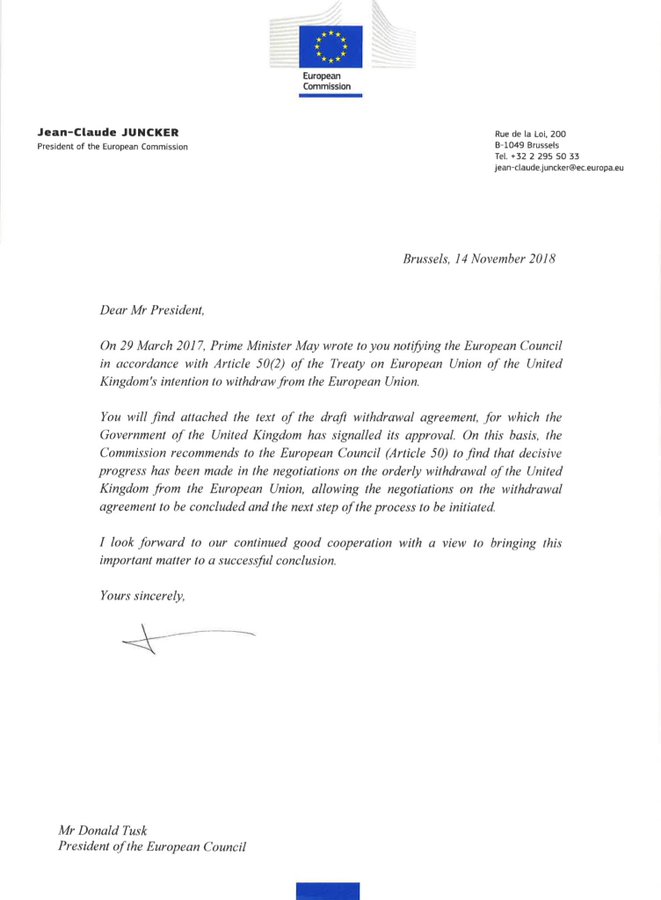Nigel
Farage lashes out at Angela Merkel, as Chancellor attends EU
Parliament debate
Brexit deal - live: Brexit deal - live: Cabinet approves Theresa May's EU withdrawal agreement but 'up to 10 ministers' voice major concerns
14
November, 2018
Theresa
May has announced on the steps of Downing Street that her cabinet has
reached a collective decision to back the draft Brexit agreement.
Senior
ministers were summoned to No 10 for one-on-one meetings with the
prime minister as news finally emerged of a draft agreement with
Brussels after months of wrangling.
Ahead
of the cabinet showdown, Ms May faced Jeremy Corbyn for a dramatic
session of prime minister's questions, where he accused the PM of
offering the British people a choice between a "botched deal and
no deal".
She
also faced the wrath of one Eurosceptic Tory MP, Peter Bone, who said
if media reports over Ms May's Brexit deal were "accurate"
then she would lose the support of Tory colleagues.
Key
Points
- Theresa May's cabinet approves EU withdrawal agreement
- Government forced into embarrassing climbdown over fixed-odds betting terminals
- May's deal plunged into crisis as Scottish Conservatives threaten to rebel
- EU says it will 'retain all controls' under PM's Brexit agreement
- DUP warn May's blueprint could lead to break up of the United Kingdom
Draft Brexit plan approved by British cabinet, released to public
RT,
14
November, 2018
Britain's
cabinet has backed Theresa May's EU withdrawal agreement, the prime
minister has confirmed. She said that the deal is the best that could
be negotiated and is in the interest of the country.
The
official text of the draft agreement consisting
of 585 pages was published by European Commission.
Top
British ministers debated whether to support the deal during a
five-hour meeting inside 10 Downing Street, with some having been
invited to the prime minister's office a day before to read it.
May
said the plan is the “best
that could be negotiated," adding
that the “collective
decision of [the] cabinet" was
to push ahead with the deal.
“And
I firmly believe with my head and my heart that this is a decision
that is in the best interest of our entire United Kingdom," she
said.
She
added that the plan is the result of “thousands
of hours of meetings." The
deal was reached as the deadline for Brexit – March 2019 – was
looming and many expressed concern that the divorce would not happen.
May
noted that the deal will come under “intense
scrutiny," while
saying she is aware that “there
will be difficult days ahead."
May
declined to answer questions from the media, saying she will make a
statement in parliament on Thursday.
Despite
the agreement being backed by the Cabinet, she is still facing fierce
opposition, including from Conservative MP Jacob Rees-Mogg who wrote
a letter to his colleagues urging them to vote against the deal in
Parliament.
He
lays out his disapproval of the plan in four parts, including the
fact that the UK will be required to hand over £39 billion to the EU
"for little or nothing in return" and will lock Britain
into an EU customs union and EU laws.
Nigel
Farage, the former leader of the UK Independence Party (UKIP) who
campaigned for a hard Brexit, has tweeted his disapproval following
May's announcement, calling the plan the “worst
deal in history" and
calling out any “genuine Brexiteers" who supported it.
Responding
to the announcement, Belgian MEP Guy Verhofstadt said the deal makes
Brexit possible while still allowing Britain to maintain a close
relationship with the European Union.
"While
I hope one day the UK will return, in the meantime this agreement
will make a Brexit possible, while maintaining a close relationship
between the EU and UK, a protection of citizens rights and the
avoidance of a hard Irish border," he
said.
The
circumstances of Britain's exit from the European Union has been long
negotiated, and Wednesday's approval of the deal puts an end to any
uncertainty surrounding Britain's future in the European Union. It
also ends the possibility of a messy “no
deal" Brexit.
Those
who are against Brexit, including Labour MPs David Lammy and Chuka
Umunna, took particular note of one part of May's announcement, in
which she spoke of three options – this deal, no deal, and no
Brexit.
Scottish
First Minister Nicola Sturgeon spoke out against the deal before it
was agreed, calling it bad for Scotland.
Meanwhile,
European Commission President Jean-Claude Juncker has recommended the
EU hold a summit with the UK this month.
The
EU's Brexit negotiator, Michel Barnier, said the deal brings legal
certainty on the consequences of Brexit, and called it a determining
step towards ending the drawn out negotiations.
Barnier
also warned that much work still needs to be done in the process of
the UK exiting the EU, and that the road to an orderly Brexit won't
be an easy one.
He
declined to comment when addressed with the question of what the EU
will do if the British parliament rejects the Brexit deal, which is
still a possibility.
Sturgeon,
however, was fine to weigh in on that possibility, saying that if it
is rejected by Parlimaent "then
the UK government must return to the negotiating table to secure a
better one."










No comments:
Post a Comment
Note: only a member of this blog may post a comment.